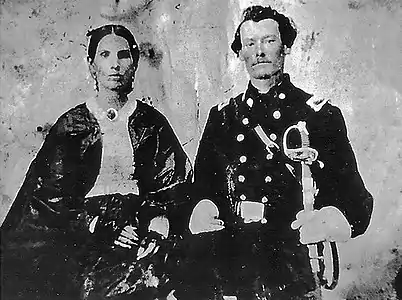George Washington Kirk | |
|---|---|
 | |
| Born | June 10, 1837 Greene County, Tennessee, U.S. |
| Died | February 17, 1905 (aged 67) Gilroy, California, U.S. |
| Allegiance | |
| Service/ | |
| Years of service | |
| Rank | |
| Commands held | 3rd North Carolina Mounted Infantry |
| Battles/wars | American Civil War |
| Spouse(s) | Maria Louise Jones[1] |
George Washington Kirk was a soldier who served in American Civil War.[2] Born and raised in Tennessee, he married Maria Louisa Jones in 1860. At the start of the war he served in the Confederate States Army, but his views were Unionist and he left the state to join the Union Army. Advancing to the rank of colonel, in 1864 he raised the 3rd North Carolina Mounted Infantry (Union) and led many raids into North Carolina.[3] Because of the regiment's guerrilla-like tactics, the regiment became known as Kirk's Raiders.[4]
Union Col. George Kirk, hailed by Union leaders as a hero, led the 3rd NC Mounted Inf. Regiment on a deep raid into Confederate territory, Camp Vance, in June 1864, just outside Morganton, where the railroad terminus was located. Kirk knew the camp was only protected by young boys, the main Confederates having been shifted to the front lines. He knew he would meet with little resistance. However, some serious opposition to Kirk was mobilized and Kirk retreated to Union lines. It was during this raid and others that Kirk's criminal reputation emerged. All manner of rape, robbery, and plunder is attributed to these Union regiments by many Confederate accounts. On the retreat from the raid on Camp Vance, Kirk ordered his men to lie on their stomachs while ordering captured young boys to stand in front of his line. Indiscriminate crime and using these young boys as human shields earned Kirk and his men extreme enmity that lasted for decades. [5] [6]
In 1870, Kirk was tasked by North Carolina Governor William Woods Holden to raise and lead a militia into Alamance and Caswell counties to quell the Ku Klux Klan. Though he was successful in breaking up Klan activity, none of the 100 men he arrested were charged by local authorities. In addition, the action led to Kirk's own arrest, and the impeachment of Governor Holden.[3] With the help of the United States Marshal, Kirk was able to escape from jail, and later was given a position as a police officer with the capital force in Washington, D.C.[7]
In 1890, it was reported that "several very rich finds" of gold, in the Maryland hills near the Potomac River, were discovered, and "being worked", on Kirk's land.[8]
 Kirk with his wife Mariah Louisa Kirk
Kirk with his wife Mariah Louisa Kirkwith_brother_and_father_(standing).jpg.webp) Kirk with his father Alexander (standing) and brother John (seated left)
Kirk with his father Alexander (standing) and brother John (seated left)
See also
References
Bibliography
- Bumgarner, Matthew. 2000. Kirk's Raiders; A Notorious Band of Scoundrels and Thieves. Piedmont Press, LLC.
- Hardy, Michael C. 2018. Kirk's Civil War Raids Along the Blue Ridge. The History Press.
Citations and Notes
- ↑ Tennessee State Marriage Record, February 28, 1860, Greene County, Tennessee
- ↑ Philips, Michael M. (9 May 2014). "Still Paying for the Civil War". Wall Street Journal. Retrieved 4 June 2020.
- 1 2 Trelease, Allen W. (9 Nov 2000). Powell, William S. (ed.). Dictionary of North Carolina Biography: Vol. 3, H-K. Chapel Hill, North Carolina: University of North Carolina Press. ISBN 9780807867136. Retrieved 2018-08-21.
- ↑ Bumgarner.
- ↑ Bumgarner, Matthew (2002). Kirk's Raiders: A Notorious Band of Scoundrels and Theives. Hickory, NC: Piedmont Press.
- ↑ Garren, Terrell (2006). Mountain Myth: Unionism in Western North Carolina. Spartanburg, SC: The Reprint Company, Publishers. p. 148.
- ↑ "Cut-Throat Kirk; A Specimen Martyr in the Bloody Shirt Crusade". Daily American; Nashville, Tennessee, Pg 2. October 6, 1876.
- ↑ "Gold Near the Capital". The National Tribune, Pg7. October 16, 1890.